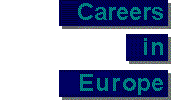The European Union (EU) was originally called the Common Market. It later became the European Economic Community (EEC) and has evolved from many smaller organisations within Europe. Since January 1, 1995 it comprises 15 member states: Austria, Belgium, Denmark, Finland, France, Germany, Greece, Ireland, Italy, Luxembourg, the Netherlands, Portugal, Spain, Sweden and the United Kingdom.
EU Policy
Each country is committed to encouraging a single market for trade purposes. To achieve this policies are developing through the various committees and councils to remove barriers to trade and to services.
These policies aim to encourage the flow of people from one country to another. Although there are obstacles the objective is that every EU citizen has the right to work, study or train in any other EU country
(see Your Rights in Europe).
The European Commission
The European Commission is responsible for drafting proposals for legislation. It has its headquarters in Brussels and is made up of 17 Commissioners appointed by the member states who represent the general interests of the community and not their individual countries.
The European Parliament
The European Parliament has over 500 elected members (MEPs), with representatives from every country. It meets in Strasbourg or Brussels and examines the proposals put forward by the European Commission. It represents the wishes of the people and has powers of democratic control.
The Council of Ministers
The Council of Ministers consists of one member from each of the participating states. Based in Brussels, its role is to adopt the community laws submitted by the commission and agreed by parliament. It is the community's legislative body.
The Court of Justice
The Court of Justice in Luxembourg makes final rulings on matters of law. It also deals with matters of law concerning international treaties.
The European Council
The European Council consists of heads of government from each member state. It meets twice a year.
The Committee of Ministers
The Committee of Ministers is a European Council body comprising foreign ministers of member states and their deputies.
EU Finance
The EU has its own budget and generates income through customs duty and agricultural levies. A proportion of VAT levied on goods and services throughout the EU also provides income and the more wealthy member states pay a proportion of their Gross National Product (GNP - the measure of a nation's prosperity).
EU finance is used to develop various initiatives and programmes throughout all of the member states. It currently funds the Socrates and Leonardo projects that directly affect young people.
The Future of the European Union
From its early beginnings, the Union has grown to fifteen member states. There is every indication that this number could increase. Applications are being considered from several countries at the present time. The three conditions that must be met by applicants wishing to join the EU are:
- a respect for human rights and democratic status
- an acceptance of the European Commission
- the ability to implement EU principles
In addition to developing its internal structure, The EU holds talks regularly with Japan and the US. The EU also has a commitment to helping third world countries in Africa, the Caribbean and the Pacific. The links being forged bring new opportunities for everyone.






